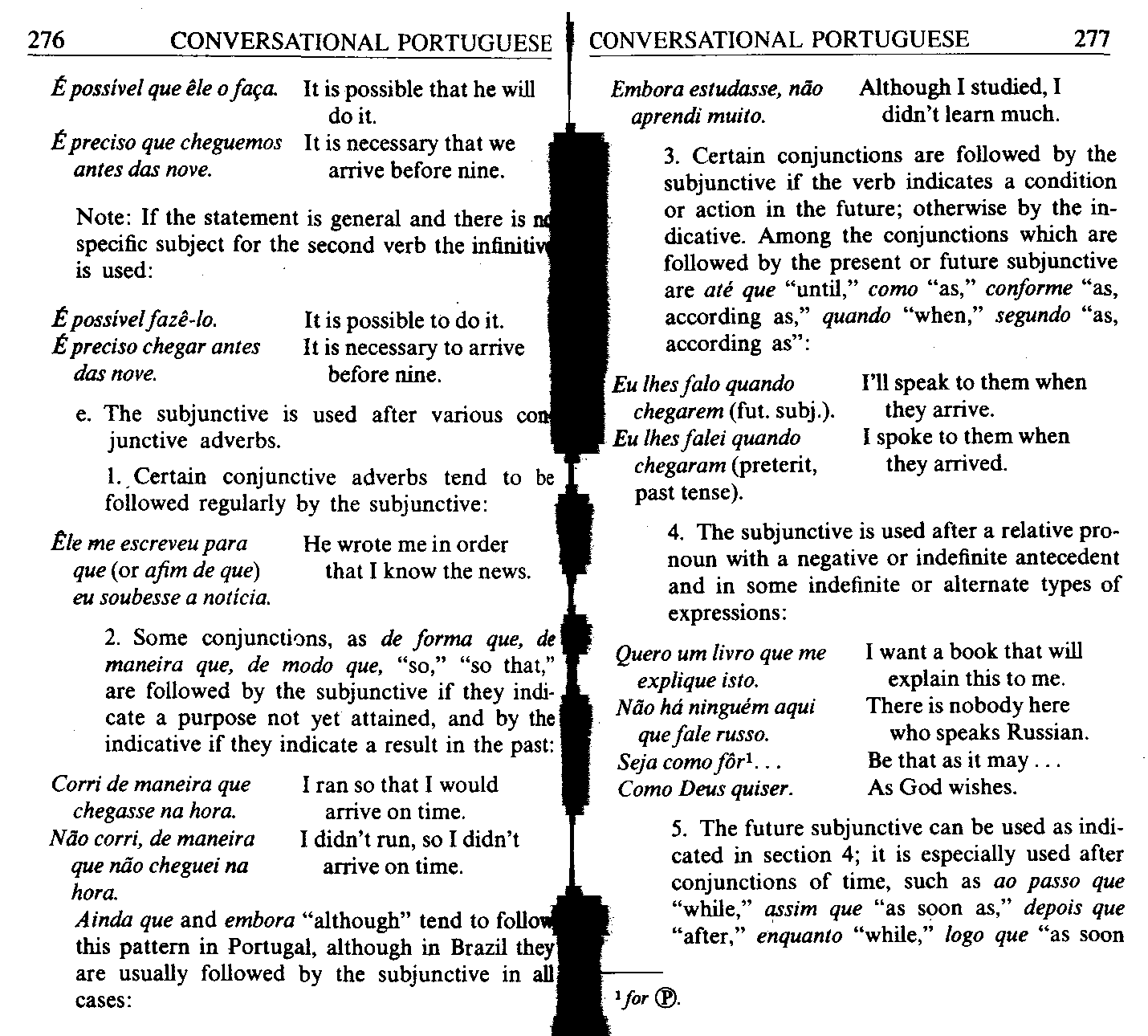Summary p276

276 CONYERSATIONAL PORTUGUESE
£ posshel que ele o faęa. It is possible that he will
do it.
£preciso que cheguemos It is necessary that we antes das nove. arrive before nine.
Notę: If the statement is generał and there is iu specific subject for the second verb the infinitiy is used:
£ posshelfaze-ło. It is possible to do it.
£ preciso chegar antes It is necessary to arrive das nove. before nine.
e. The subjunctive is used after various eon junctive adverbs.
1. Certain conjunctive adverbs tend to be followed regularly by the subjunctive:
£le me escreveu para He wrote me in order
que (or afim de que) that I know the news. eu soubesse a noticia.
2. Some conjunctions, as de forma que, de I maneira que, de modo que, “so,” “so that,” are followed by the subjunctive if they indi-cate a purpose not yet attained, and by the] indicative if they indicate a result in the past:
I ran so that I would arrive on time.
I didn’t run, so I didn’t arrive on time.
Corri de maneira que chegasse na hora.
Ndo corri, de maneira que ndo cheguei na hora.
Ainda que and embora “although” tend to folk this pattem in Portugal, although in Brazil they] are usually followed by the subjunctive in cases:
3. Certain conjunctions are followed by the subjunctive if the verb indicates a condition or action in the futurę; otherwise by the in-dicative. Among the conjunctions which are followed by the present or futurę subjunctive are ate ąue “until,” como “as,” conforme “as, according as,” ąuando “when,” segundo “as, according as”:
1*11 speak to them when they arrive.
1 spoke to them when they arrived.
Eu Ihes falo ąuando chegarem (fut. subj.).
Eu Ihes fałei ąuando chegaram (preterit, past tense).
4, The subjunctive is used after a relative pro-noun with a negative or indefinite antecedent and in some indefinite or altemate types of expressions:
Quero um livro ąue me I want a book that will
explique isto.
Ndo ha ninguem aąui ąue fale russo.
Seja como Jor1... Como Deus ąuiser.
Embora estudasse, ndo aprendi muito.
Although I studied, I didn’t leam much.
explain this to me. There is nobody here who speaks Russian. Be that as it may...
As God wishes.
5. The futurę subjunctive can be used as indi-cated in section 4; it is especially used after conjunctions of time, such as ao passo ąue “while,” assim ąue “as soon as,” depois ąue “after,” enąuanto “while,” logo ąue “as soon
'for (g).
Wyszukiwarka
Podobne podstrony:
Summary p288 288 CONYERSATIONAL PORTUGUESE Although both forms are used, therc is a tend-ency for
Summary p254 254 CONYERSATIONAL PORTUGUESE Nao me escreva mais. Eles decidiram que nos mandar
Summary p256 256 CONYERSATIONAL PORTUGUESE 21. SOME CONJUNCTIONS ainda que assim que ate
Summary p222 222 CONYERSATIONAL PORTUGUESE 21. Vamos_(to have dinner). a. jantar
Summary p224 224 CONYERSATIONAL PORTUGUESE (3) variations occur in different areas: a.
Summary p226 226 CONYERSATIONAL PORTUGUESH CONYERSATIONAL PORTUGUESE 227 d g g h j I I Ut m as d i
Summary p230 230 CONYERSATIONAL PORTUGUESE 3, The cedilla (cedilha) is used with
Summary p234 234 CONYERSATIONAL PORTUGUESE k. with parts of the body and articles of clothing inst
Summary p236 236 CONYERSATIONAL PORTUGUESE De and em combine with the demonstrative forms (see GS2
Summary p238 238 CONYERSATIONAL PORTUGUESE 13. MASCULINE AND FEMININE 238 CONYERSATIONAL PORTUGUES
Summary p240 240 CONYERSATIONAL PORTUGUESE 14. THE PLURAL 1. Nouns ending in a vowel, including na
Summary p242 242 CONYERSATIONAL PORTUGUESE seu can also be used to translate “his,” “her,” “their.
Summary p246 246 CONYERSATIONAL PORTUGUESE 1«. COMPAR1SON 1. Rcgular comparison facil easy ma
Summary p248 248 CONYERSATIONAL PORTUGUESE 19. PRONOUNS Pronouns have varying forms depending on w
Summary p250 250 CONYERSATIONAL PORTUGUESE CONYERSATIONAL PORTUGUESE_ 251 (te) I
Summary p258 258 CONYERSATIONAL PORTUGUESE 23. ADYERBS 1. Some Portuguese adverbs are formed by ad
Summary p260 260 CONYERSATIONAL PORTUGUESE la (acold) there (morę remote) adiante . forward,
Summary p262 262 CONYERSATIONAL PORTUGUESE sabdo soap sabonete a cake of toilet
Summary p264 264 CONYERSATIONAL PORTUGUESE Ndo ąuero este sem I don’t want this one
więcej podobnych podstron